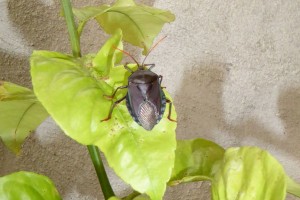When inspecting plants look out for tell-tale signs:
- the actual animals, often sucking at the most tender leaves. Black adult or orange immature bugs
- limp and wilting leaves
- leaves that show brown, burnt areas
- intense, repugnant citrus smell
Preventive measures:
- Not many predators go for stink bugs because of their caustic defence tactics.
- Make sure that the plants are healthy by feeding, watering and mulching accordingly.
Dealing with citrus stink bugs:
- Physically removing stink bugs is the best approach. Try to get them when they are still in their orange youth stage, so they haven’t reproduced yet. Be aware of the aggressive defence tactics of stink bugs. They squirt a caustic liquid when they feel threatened. This liquid can seriously hurt the skin and is dangerous if it gets into your eyes. Don watertight rubber (no ordinary gardening) gloves and eye protection! Collect them and squish them or drown them in a jar filled with methylated spirits.
- If stink bugs get established we need to do something about their eggs and nymphs. This spray needs to be applied for about 4 weeks, once a week and after every rain.
Thoroughly mix in the 5 litre spray-can
5 liters of water
2 tbsp of liquid soap - If stink bugs persist and/or when the weather allows it (not hotter than 30°C and no intense sunshine – otherwise the oil will burn the leaves) the spray can be made a bit more aggressive by adding
8 tbsp of cooking oil
Important notes on using the spray
- this spray is not toxic to humans
- fill water into the spray-can first, then add soap to avoid to much foam to develop
- spray top- and downside of the leaves and all of the rest of the plant
- never spray in bright sunlight because this will burn the leaves and cause more damage than it helps. Spray in the late afternoon
- don’t spray too late in the day. The leaves need to dry off before nightfall, otherwise you are inviting in spores fungi by offering a humid night environment. Spray in the late afternoon
- spraying needs to be done consistently, once per week and after every serious rainfall until the aphid problem is in control
- make a note in the garden log book about what you applied and where, so following gardeners know where to pick up the work
- always rinse the spray-can and its hose. It’s hard to fix it, if it gets clogged up
